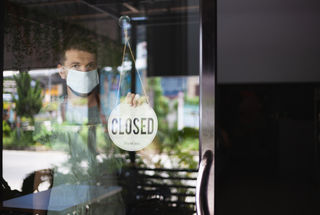How has COVID-19 impacted the Swiss hospitality sector?
Darren Burke - Chef Instructor at Culinary Arts Academy Switzerland - shares the pandemic’s effects on the industry and the opportunity to reimagine business for a post-COVID era.




Even as the world continues to ease its COVID-19 restrictions, for those of us who are restaurant owners, suppliers, and hospitality staff, we are not expecting a return to “business as usual.” In fact, after 20 months of navigating government restrictions set to combat the virus, many of us in hospitality are beginning to reevaluate our business models altogether.
In Verbier, an idyllic resort town in French-speaking Switzerland, one does not have to look far to see the effects the virus has had on local business. Restaurants and bars normally packed with customers, traveling from all over the world to ski the region’s picturesque slopes, are now eerily empty. For restaurateurs with razor-thin profit margins, even one month of restrictions has brought with it the difficult decision to close their doors for good.
An uncertain future for seasonal workers
Towns like Verbier, which are heavily reliant on international clientele and seasonal workers, must now grapple with an uncertain future.
When the government restrictions forced restaurants and kitchens to shut their doors, hospitality workers were sent home. The owners received government assistance for the duration of the closures, but for seasonal workers, this support ended with their contract. With restrictions in place all over the world, what are seasonal workers to do?
This is a question the hospitality industry, which is largely dependent on seasonal workers, will have to answer or else leave a huge portion of our workforce with little certainty for the future.
The pandemic has forced the industry to ask itself: What does this mean for local business? What does the future of hospitality look like? Are there any positives we can take away from this situation?
Restaurant suppliers feel the pressure
With restaurants closing their doors, suppliers have also felt the pressure of the pandemic in their own unique ways—namely a sharp drop in business and revenue.
Marc Dubosson from the Laiterie de Verbier says he’s experienced at least a 50 percent drop in sales compared to the same time last year. As a result, he’s had to rethink his business moving forward.
“For me, it’s about stock. As sales have dropped drastically, many cellars are beyond full so we simply cannot continue to produce at the same rate. For example, we typically produce 60 cheeses a day, but because of the decline in sales we have a surplus of around 2,000 cheeses in our cellar at the moment. You can imagine for larger producers, this surplus is even greater.”
Dubosson has decided to stop production altogether for two weeks and ship his milk to a processing plant to produce drinking milk, but this comes at a price.
“Milk for consumption is sold at CHF 0.50 per liter, while it is sold at CHF 1.00 per liter to make cheese. So, there is most definitely a cost for farmers. And the fact that all the big festivals last summer in Verbier were canceled made things extra difficult. Business is normally good during the summer months, so this also had an impact.”
Despite the increased pressure, Dubosson is hopeful. “We are a family business with low overhead costs, so I think we will be okay in the short term, but we have to adapt.”
Industry at a crossroads
Even as restrictions continue to ease, most of us in hospitality are not counting on a return to the status quo. If anything, people are harnessing the flexibility and adaptability needed to succeed in hospitality pre-pandemic to pivot into new ventures.
Take, for instance, my friend who recently launched a meal delivery business, which ships boxes of ingredients with recipe instructions. They started producing between 300 and 400 boxes per week and have since grown close to 300,000 boxes a week! They had to set up an entire production marquee to meet the demand.
There are similar stories of “Dark Kitchens” popping up, selling meals exclusively through delivery. Before the crisis, restaurants already felt the strain of tight cash flow, high overheads, and small profit margins. Dark kitchens offer a financially viable business model, in which they can sell quality prepared food directly to the customer and cut out many of the typical overheads such as prime location rental fees and staff. This was an approach that was showing growth before the crisis and has since skyrocketed.
Of course, most hospitality experiences—like the traditional restaurant—will always have a place in community life. Meeting with good friends, celebrating special occasions, and families getting together are important moments restaurants serve. But just maybe, after this period of forced isolation, the restaurant industry will begin to rethink what it even means to be a restaurant—a prospect both scary and exciting.
As in any crisis, if we want to come out stronger, we must adapt, reevaluate, and consider new ways of moving forward. If people want to succeed in an ever-changing industry like hospitality, then we must learn to be flexible and innovative.
Culinary Arts Academy Switzerland, part of Swiss Education Group, is regarded as one of the world’s finest culinary schools thanks to a comprehensive curriculum that blends a hands-on culinary arts education with practical business theory.
Discover the different programs and degrees offered at Culinary Arts Academy Switzerland and how they will help you build the strong foundations you need to succeed in the culinary world.
To learn more or apply to Culinary Arts Academy Switzerland contact Regina da Silva at [email protected].